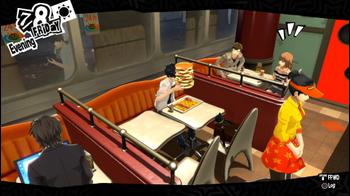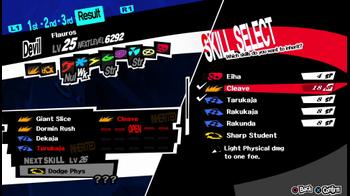
Persona 5 Review
The wait is over. Winter 2014 has finally come. Japan has been able to play it for a while now, but Western fans can finally breathe a sigh of relief - Persona 5 is here. It’s such a remarkably massive game that it took two of us to properly cover it: Josh has been playing and mulling over Persona 5 since its Japanese release, while Alex joined the fray a few weeks ago with a pre-release copy of the final English release.
Two heads are better than one, but the conclusion is fairly unanimous: Persona 5 is one of the best Japanese RPGs in recent memory, if not ever.
The main thing that sets Persona 5 apart is its confidence. Where other major players in the Japanese RPG world have seen fit to experiment with Western-style gameplay ideas or struggled to figure out how to build on their established tropes, Persona 5 presents a strong, well-defined vision and does so in an uncompromising way. The result is unforgettable.
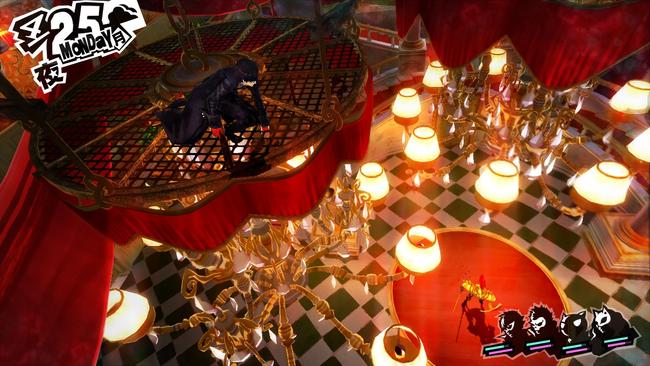
It’s difficult to know where to start, so let’s start at the beginning. Persona 5 has the traditional series opener with a twist: you’re a transfer student moving to a new school, but the reason you’ve been forced to uproot your life is that you’ve been convicted of a crime. Your parents, shamed, send you away. The game leans into this hard; where the Persona 4 crew were a Scooby Doo style ragtag bunch, the Persona 5 crew are united through being outcast from society. You, the criminal, are the most outcast of them all.
After a dynamic flash-forward opening, the game begins proper, told in flashback. Major story events will see you catapulted back to the cold, harsh ‘present day’ setting which serves to underpin even Persona 5’s most light-hearted events.
While it’s still filled with many of the colorful characters and cute moments series fans have come to love, Persona 5 is also thematically rich in a way its predecessors arguably weren’t.
From a Western perspective it’s a fascinating and unflinching portrayal of Japan - as much social commentary as it is a coming-of-age story.
What begins as a simple story of trying to get by grows into a surprisingly raw narrative about a conservative society gone too far and finding the strength to overcome incredible societal pressures. The story moves beyond personal redemption into a study of troubled, flawed personalities that society has put through the wringer. Somehow, this story manages to marry anime stereotypes with serious narrative points and play those tropes as a strength.
Impressive though it often is, the story isn’t without fault. Like previous Persona games, the daily calendar system sometimes works to its advantage and sometimes hurts it - the structured nature of its story can lead to slumps. The game always pushes through slumps quickly enough however, and the game's colorful cast help to keep you moving through these bumps in the road.
Persona 5’s core cast of Phantom Thieves is one of the best the series has produced. Their personalities shine and they bounce off each other well. The band of misfits become a strong ensemble, united by their alienation from society.
It’s not all writing and voice-over this time either: the higher-fidelity art style that debuted in Catherine does great work here, with Yusuke’s socially awkward demeanor and Futaba’s commitment to hiding her face particularly effective visual cues to add to their characters.
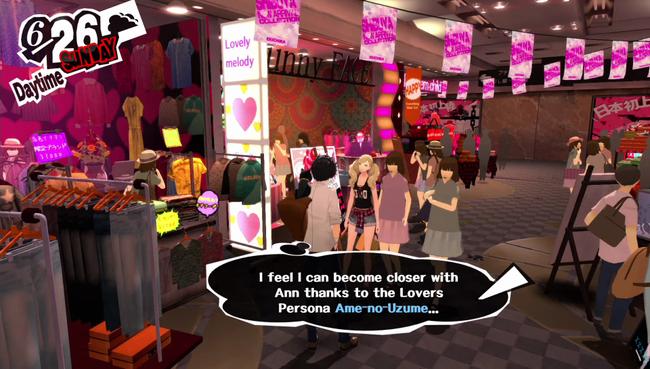
Though Persona 5’s actual character models are miles ahead of previous titles, the majority of its life as a PS3 title shows in some environments on the PS4 version. Several low-resolution textures can stand-out at times, but they did very little to tarnish our enjoyment of the game.
While the main crew is overall quite lovable, late game characters suffer from having less time to develop than those introduced early on. Some might feel a bit familiar to past Persona games with some characters filling the same broad roles, but the execution in Persona 5 helps them to stand apart. They’re the type of characters you want to spend more time with.
As we talk about characters, it’s only right to touch on the localization. Dedicated fans might’ve caught on social media that, yes, there are some bum pronunciations in the game, but these little blips mislead; this is a fantastic localization effort.
The voice cast is likeable, and the translation seems to hit all the right beats with confidence. It can be funny, or profound, or deliberately silly. Harrowing and easy-to-miscue moments, such as an attempted suicide, are handled deftly. The small adjustment of dropping the Japanese honorifics from the English-language dialogue also makes a world of difference to make every line sound a little more organic and natural to Western ears.
While the starring cast are excellent, it’d be remiss not to mention the Confidants - Persona 5’s equivalent of Social Links. Your relationships with these characters will offer rewards that’ll impact your abilities in combat, and these rewards are now generally much more substantial and specific. Befriend a shady doctor and she’ll offer discounts on and more kinds of medicine consumables. Get to know a maid and she’ll be able to do minor tasks for you, freeing up vital time for other pursuits.
Each is like much of the supporting cast: well-written, likeable, and written in service of Persona 5’s broader themes about Japanese society. Confidants feel like an upgrade.
One last omnipresent character is worth mentioning specifically: Tokyo itself. Persona 5 presents a distilled representation of the dense city, employing clever tactics to make it feel alive. Littered with silhouettes of non-important NPCs, it always feels busy and crowded. Faceless masses go about their own business as overheard speech bubbles show their mumbling and gossiping.
A wide variety of locations helps it to all feel real even if many locations are single-screen affairs, and crucially there are a ton of things to do. Multiple districts open up each with their own unique flavor and their own activities to do and inhabitants to meet.
Raising parameters is even more vital here than in previous games, so how you spend your time in the various areas of Tokyo becomes a major conundrum. In a Catherine-like fashion, you can view online stats to see how others spent their time to help make an informed decision if you like - though it felt a bit like cheating to us.
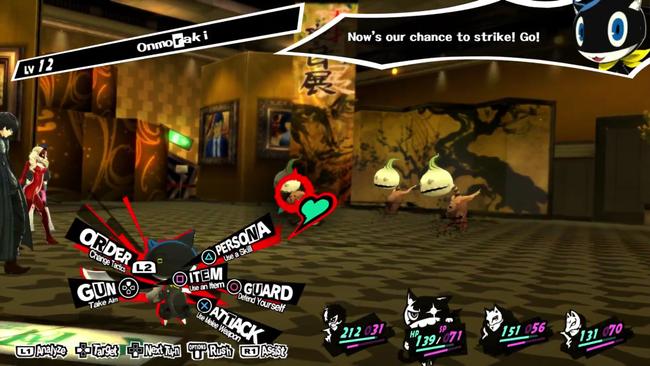
Persona 5’s day-to-day grind around Tokyo is split by traditional turn-based RPG combat, but even that has had an overhaul. Gone are the fairly lackluster randomly generated dungeons from its predecessors - each major story dungeon (or rather, Palace) in Persona 5 is a uniquely designed map that’s filled with original challenges and puzzles.
This makes a great deal of narrative sense; each palace in Persona 5 is basically a heist of another person’s mind, and each palace deeply reflects their personality in every way, from the guards that prowl its hallways to its design, layout, and puzzles.
Aside from a frustratingly fiddly stealth mechanic and the odd bit of camera trouble it brings forth, dungeons are an absolute treat to navigate. Small touches like safe rooms where you can review your situation with your comrades and ‘end of session’ progress reports when you leave the dungeon add much to the experience. The cover system fits well with the thievery and heist themes, though it’s a shame that it feels a bit of a pain to use sometimes.
Once you catch an enemy off-guard or get caught by them, you’re thrown into battle. Persona 5’s combat is a great example that the turn-based RPG can still work. Those menus look busy at first, but the idea of mapping each major action to a face button ends up as a stroke of genius, eliminating the tedium of navigating a list-style menu. Everything is fast and snappy.
Best of all, after a while muscle memory kicks in and you’re able to cycle through attacks, Persona skills and characters rapid-fire to make combat look ridiculously slick. You feel like a badass.
Turn-based battles don’t have to be stodgy and slow. Small tweaks such as the character-switching baton pass let you feel like you have more control over the flow of combat than ever before, though baton passes have to be earned via landing critical hits - a smart system.
At its core, Persona 5’s battle system is a culmination of the best features from the rest of the series presented in a streamlined and tightly-wound package. Knocking down foes, ally bonuses, and elemental vulnerabilities all return as they were. These things weren’t broken and thus didn’t need fixing.
Guns can be used as a unique weapon in combat (and there’s a lovely, smart explanation for why students have guns), while demon negotiations also return to offer a little more depth to the demon catching or bonus loot process than P3 and P4’s shuffle time. Older fans will be pleased to hear that demon negotiation is a faster process, and the system is well-framed within the thief theme of the game with negotiations depicted as a ‘Hold Up’ where your party holds a demon in a stick-up with guns raised.
With demons in the limelight once more, Persona 5 flexes its art design and graphics engine by bringing artist Kazuma Kaneko’s creatures into the HD era. Demons are beautifully rendered with modern technologies to give Persona 5’s battles a lot more variety over the previous Shadow enemy variants. Other series staples are given similarly loving attention as demons, including a more oppressive Velvet room staffed by a far less immediately welcoming Igor and attendants.
Combat isn’t limited to the story palaces and if you miss the old randomly-generated dungeons, there’s good news: you can also visit Mementos, a massive dungeon that resembles Persona 3’s Tartarus in reverse. Rather than stretching up, Mementos goes underground via Tokyo’s subway system.
This content is optional, but can impact your ending and provides the ability to grind, tackle subquests, or just enjoy the combat outside of the confines of the basic story. It’s exactly what you’d expect - more randomly-generated Persona mazes with deeper depths and harder challenges unlocking as you progress the story. The main dungeons are a huge improvement and Mementos can be a little dry, but it’s also nice to see this tradition not left out entirely in favor of them.
A large part of what makes Persona 5's world consistently fun to explore, even in the randomly generated Mementos, is its gorgeous user interfaces. These menus felt a little crowded for the first hour or so, but they quickly begin to click. You learn their eccentric flow, and once you do they’re nothing but incredible style without any loss of Persona 3 or Persona 4’s substance. Moreover, they perfectly represent what Persona 5 is at its heart.
The soundtrack is similarly impressive, and though this has always been a stand-out element of Persona it’s important to report that Persona 5 is no exception. Several main themes run through the game, with some appearing multiple times with different tones and styles for different situations. You barely notice when the music subtly shifts when it rains, but it does. When you begin the triumphant final stage of a palace heist, the score steps in to act as your personal hype man. Persona 5's new vocalist, Lyn, does an oustanding job adding a peculiarly soulful flavor to the score.
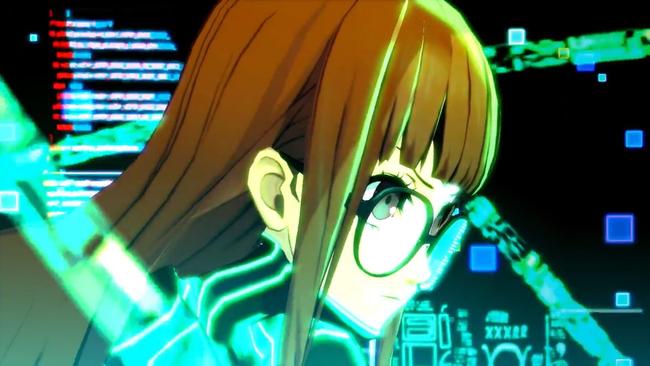
All of these elements are amazing on their own, but together they make Persona 5 a masterpiece. The narrative is engaging, the combat is fun, and the characters are excellent, but the brilliant, confident framework that holds these elements together is what really sets this game apart from its already great predecessors.
Persona 5 oozes style but never feels compromised as a result - in fact, the game’s intense and unique sense of self feels woven into the very fabric of its being. Video games now come from such large teams that it’s genuinely quite difficult for modern games to feel cohesive and absolute end-to-end, but every aspect of Persona 5 feels in tune with and in service of what the game is trying to accomplish, and it’s in this that Persona 5 is most superb.
Aside from that it's just a bloody good game, though. Small missteps with localization blips, stealth systems and an underwhelming final stretch of combat towards the end can't take away from that significantly - the rest is too special.
And so here we are: we give out a handful of perfect scores in our 11-year history and then three come along at once - go figure. Persona 5 is absolutely deserving of that level of praise, however. Small nags and flaws can't drag this experience. There is too much here that's too special to call this game anything other than fantastic; a must-play. More than this, Persona 5 feels important too, especially to much of this site's audience. It's a startlingly confident assertation that the JRPG is not dead. It's the sort of game that reminds us of the genre's golden age.
You'll struggle to find a more complete, self-assured, forward-thinking, and simply joyous example of the modern JRPG than this. Persona 5 knows what it is and is unashamed about it: the result is a game that, for all its themes about imprisonment and societal slavery, is free of shackles itself. That freedom makes it series-defining, genre-defining, and a must-play.
